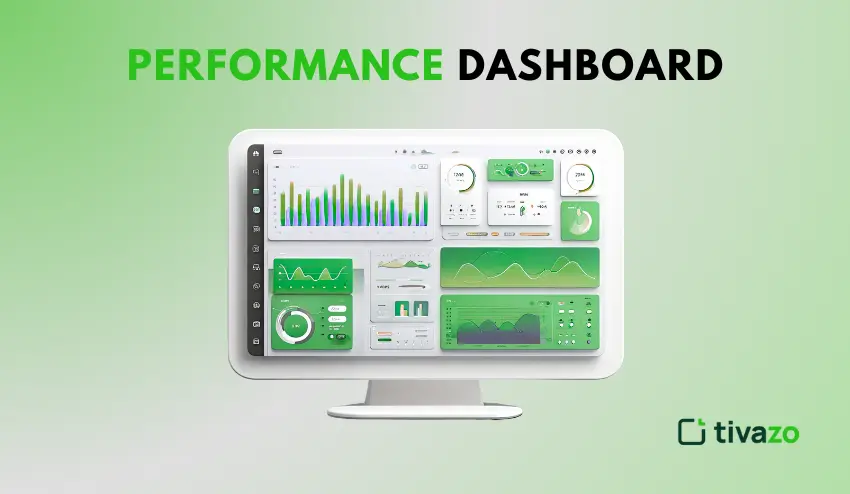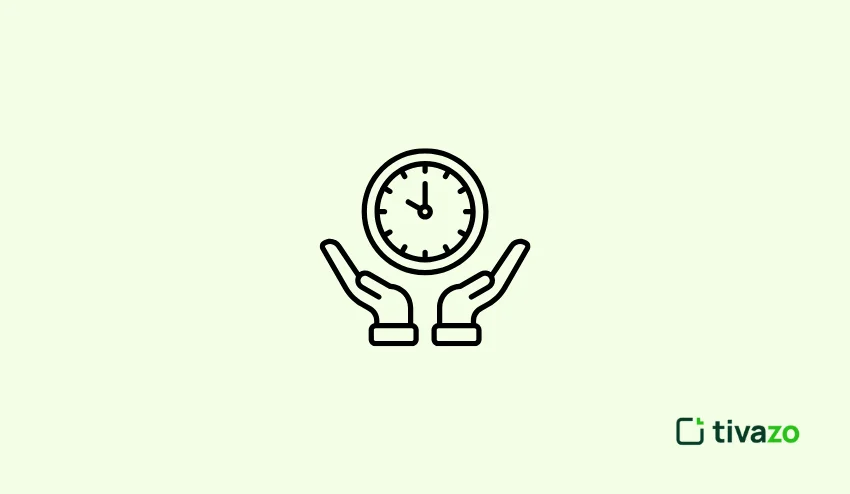Time is the only resource that you cannot get back. It is important to know where your hours are going whether in managing employees, being a freelancer or a business owner, this is the secret to making better decisions, improving performance and keeping proper records. This is where time tracking comes in.
In this guide, I will tell you why time tracking is important, who must do it, how time tracking can benefit various kinds of people, what the possible drawbacks are, and why a time tracking app can make the entire process easier. I will also provide my best suggestions on time tracking tools to consider.
Key Highlights:
- What Is Time Tracking?
- Why Time Tracking Is Important
- Who Should Track Time?
- The Benefits of Time Tracking for Different People
- Downsides of Time Tracking
- Why Use a Time Tracking App?
- 3 Time Tracking Tools Worth Trying
- How to Get the Most Out of Time Tracking
What Is Time Tracking?
Time tracking refers to the act of keeping a record of the time that is used in a particular task, project or activity. It may be either manually using timesheets or automatically using time tracking software and time tracking tools.
By monitoring the time of employees or yourself, you will have a clear picture of what you are doing with your working day. This time tracking information is vital in planning projects, controlling billable hours, and finding means of enhancing productivity.
Time tracking is not just a timesheet; it is making informed decisions. A good time tracking data will help you to know where you are wasting time, focus on some tasks, and accomplish your goals and objectives in a more effective way.
Why Time Tracking Is Important
The importance of time tracking is highly ignored by many people. Without it, projects get off track, deadlines are not met, and employee work hours become a guessing game.
Here’s why time tracking is important:
- It enhances project planning since it reveals the actual time taken in tasks.
- It makes you more productive as it keeps you focused.
- It gives the right time records to bill clients.
- It eliminates time theft since the time of employees is taken into consideration.
- It facilitates the improvement of future projects through past time tracking data.
Knowing where every minute of your time is spent, you can charge clients properly, control the time spent by your employees, and make reasonable decisions about the future. These benefits of time tracking explain why time tracking is important.
Who Should Track Time?
After knowing why time tracking is important, we need to know who should use it. In my experience, everyone benefits from time tracking, but certain groups need it more than others:
- Businesses and Teams- It can be used to manage the time tracking of employees, to guarantee that the employees are fairly paid, and to make better project planning by displaying where the work hours are actually used.
- Freelancers – It is easier to invoice when one is able to track the billable hours and maintain a proper record that creates confidence in the eyes of the client.
- Law Firms – The profitability of many law firms is based on proper time and billable hour tracking of employees per case.
- Remote Teams- Tracking the time of the teams prevents miscommunication, equalizes workloads, and ensures accountability.
- Project Managers- Accurate time tracking data means better scheduling, realistic deadlines and improved resource allocation.
When you have deadlines, deliverables, or clients, time tracking is more than just a good habit: it is a key to running a smooth operation.
The Benefits of Time Tracking for Different People
What are the advantages of time tracking, depending on your role?
For Employers
- It increases the time tracking of employees and enhances accountability of each team.
- Assists in determining time theft or time wastage and minimizes time wastage.
- Supports informed decisions about resource allocation and staffing needs.
- Makes the planning of projects more accurate in future projects by learning the past data.
For Employees
- Monitors the progress of certain tasks, and it is easier to keep up with the schedule.
- Helps improve focus and increase productivity by reducing distractions.
- Makes goals and objectives achievable by having a clear time allocation.
- Gives a clear image of how to spend time on everyday work, enhancing self-management.
For Freelancers & Contractors
- Makes it easy to keep track of billable hours and handle various projects of clients.
- Makes sure you charge your customers fairly and properly on the work done.
- Makes a correct record to report and comply with the tax.
- Freelance time tracking establishes trust in clients by having open time entry and reporting.
For Project Managers
- Ensures that projects are on schedule and provides real-time tracking of progress.
- Enhances project planning with the help of precise time tracking information.
- Assists in the proper documentation of milestones and progress to the stakeholders.
Time tracking tools can help all the functions within the business ecosystem when applied efficiently.
Downsides of Time Tracking
Although the benefits of time tracking are great, it is necessary to know the possible disadvantages to be able to overcome them:
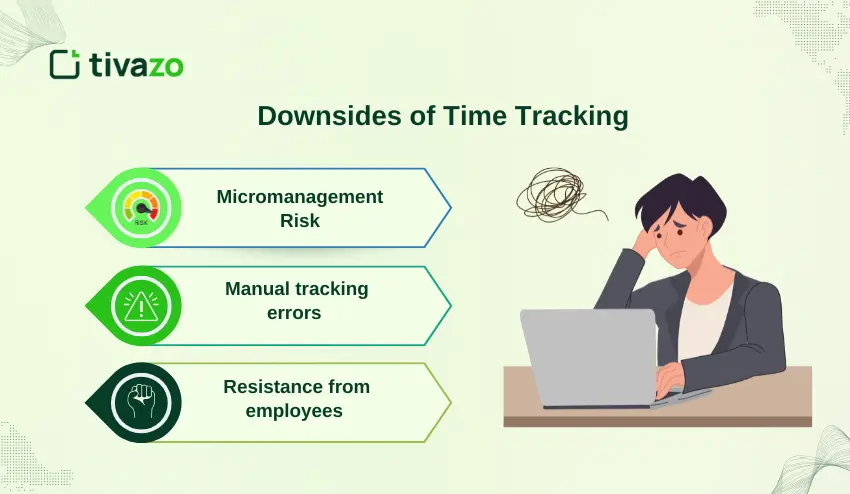
Micromanagement risk
When managers spend too much time tracking every minute, time tracking of employees may seem more like spying than a helping hand. This may hurt trust and demoralize, particularly in a creative or team-based setting. It should aim at utilizing time tracking information as an improvement tool rather than a method of constantly monitoring employees.
Manual tracking errors
The use of spreadsheets or manual timesheets can result in missed entries or inaccurate reporting. Without automatic time tracking, you are at risk of inaccurate data that may result in inaccurate billing or the wrong project planning decisions.
Resistance from employees
Introducing new time tracking tools might be disliked by the employees. It could be seen as an extra burden by some of the team members or that the management does not trust them. Unless there is effective communication on the purpose and benefits, the adoption rates may be low.
The solution? Select time tracking software that can automate the process as much as possible. Combine it with open communication on how the time tracking data will be utilized to assist in workload management, enhance efficiency, and assist in accurate billing, not to penalize or micromanage.
Why Use a Time Tracking App?
You may have experienced using spreadsheets or paper records and you can understand how easy it is to miss an entry or make a mistake. If you still wonder why use a time tracking app, here’s why:
- Time tracking is automatic and eliminates human error and records work hours in real-time.
- Connects to your task manager and project management tools, and you can monitor progress without having to switch between platforms.
- Makes correct records without an additional administration load to your day.
- Tracks billable hours, employee hours and time spent on certain tasks under a single platform.
- Provides information about the time that teams spend on various activities, so that you can make informed decisions to improve productivity.
The best time tracking tools also give the flexibility to log time wherever you are, be it in the office, remotely working, or on the move. That is why they are perfect for remote teams, busy freelancers, and those who have to work on several projects simultaneously. Using the right app can show you the benefits of time tracking.
3 Time Tracking Tools Worth Trying
Here are three time tracking tools I’ve found to be effective for different needs:
1. Tivazo
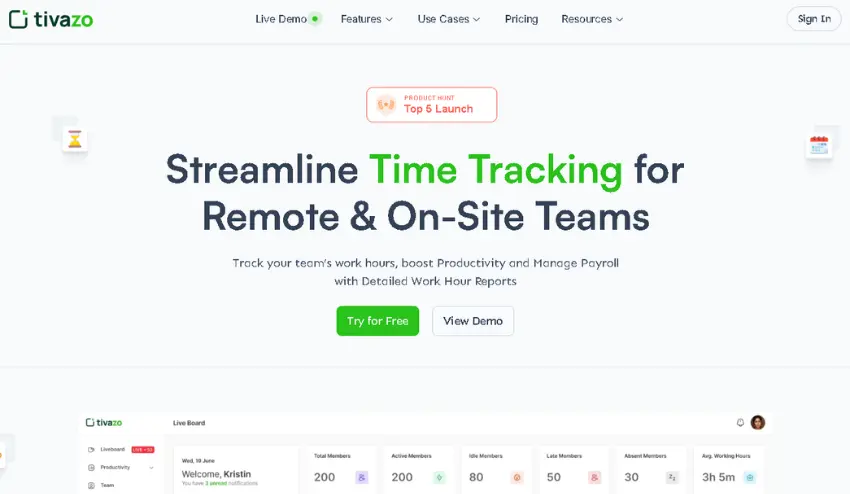
Tivazo is an automatic and simple time tracking software. It operates in the background without any interference with workflow and automatically monitors time spent on tasks, meetings, and client work. It increases productivity by integrating automation with the Pomodoro technique, motivates breaks to avoid burnout and offers an easy-to-use dashboard with live updates, deadlines, and project goals.
Features :
- Attendance management in real time
- Automatic time tracking & web based timesheets
- Scheduling & adjustments of shifts
- Integration of project management tools
- Optional screenshots & idle time detection
- Support of offline tracking
2. Hubstaff
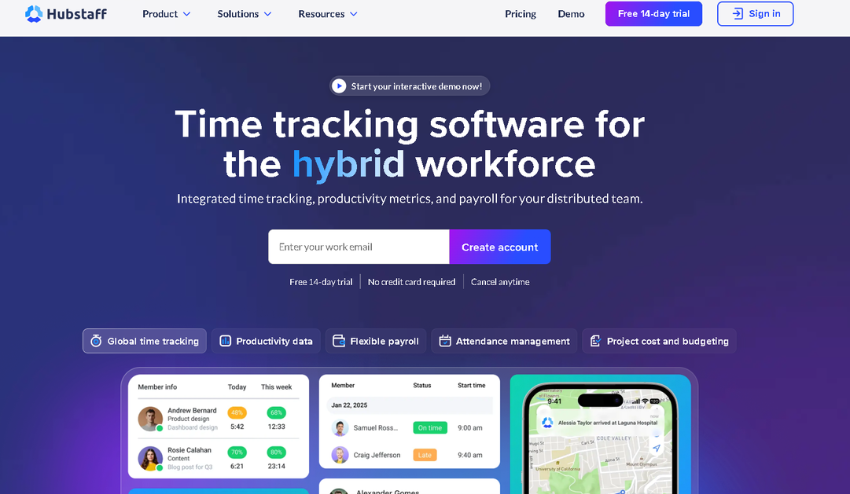
Hubstaff is an effective time tracking tool that is used by teams and remote employees. It provides automatic tracking, monitoring of productivity and simple payroll integration. Hubstaff allows avoiding time theft and enhancing team responsibility through such features as screenshots and activity levels.
Features :
- Created to track employee time and teams time.
- Provides automatic time tracking and productivity.
- Perfect to prevent time theft in remote and hybrid teams.
3. Toggl Track
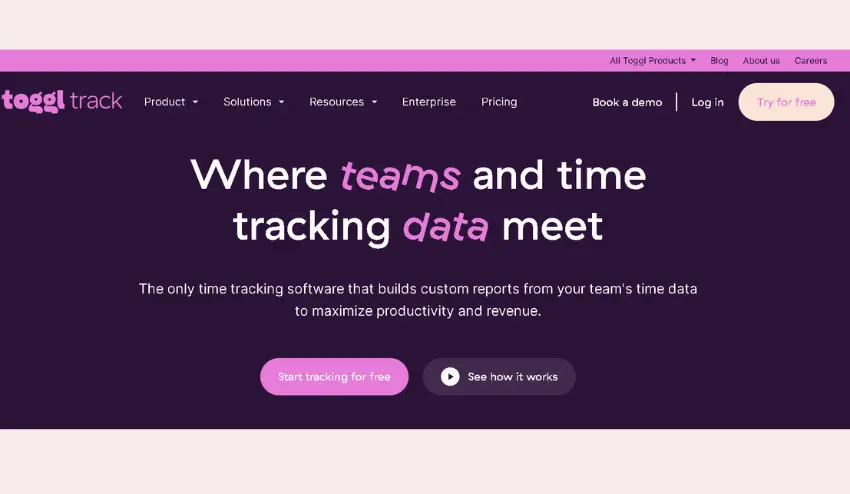
Toggl Track is an easy-to-use time tracking software that is ideal to use by freelancers and teams. It allows you to monitor time spent on tasks in a short time and provides detailed reports to enhance project planning and productivity. Toggl is compatible with most project management systems.
Features :
- Easy time tracking of certain activities.
- Excellent when it comes to future projects planning and informed decisions.
- Adaptable to freelancers, agencies and law firms.
How to Get the Most Out of Time Tracking
The best way to maximize the benefits of time tracking is to make it strategic. These are some of the tips that can assist you in making the best out of your time tracking:
- Have clear goals and objectives prior to tracking. Understanding what you want to accomplish, such as getting more productive, cutting overtime, or managing client billing better, will enable you to prioritize your tracking process so that you can focus on the most critical areas.
- Wherever possible, use automatic time tracking. This saves the time of manual input and error. Automatic tracking tools record your work in real time, providing you with more accurate and detailed data with less work.
- Check your time tracking records on a regular basis preferably once a week. Regular reviews enable you to see trends, detect bottlenecks and make decisions in a timely manner instead of waiting until the end of a project or month.
- Make time tracking a part of your project planning process. Estimate task durations, make wise resource allocation and realistic deadlines using the data. This will assist in maintaining your projects on time and budget.
- Apply the time tracking knowledge to enhance employee efficiency in terms of work hours. Find out where the time is wasted or used on low-value tasks and seek to streamline the work processes or reallocate the tasks.
Time tracking is not just a logging exercise when it becomes part of your daily culture, but it becomes a powerful tool that helps to improve planning, accountability, and overall success.
Conclusion
Knowing why time tracking is important is just half the battle. The actual change occurs when you do it regularly. Monitoring the time spent by employees, billable time, and time tracking software, you establish a precise record that enhances productivity and helps to plan projects better.
Time tracking will help you know where your time goes whether you are running a law firm, a remote team or even freelancing. The result of that clarity is more informed decision making, less missed deadlines, and a healthier bottom line.

